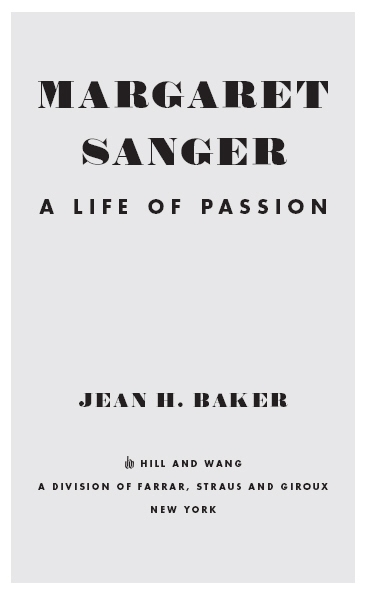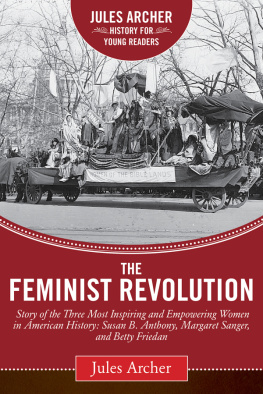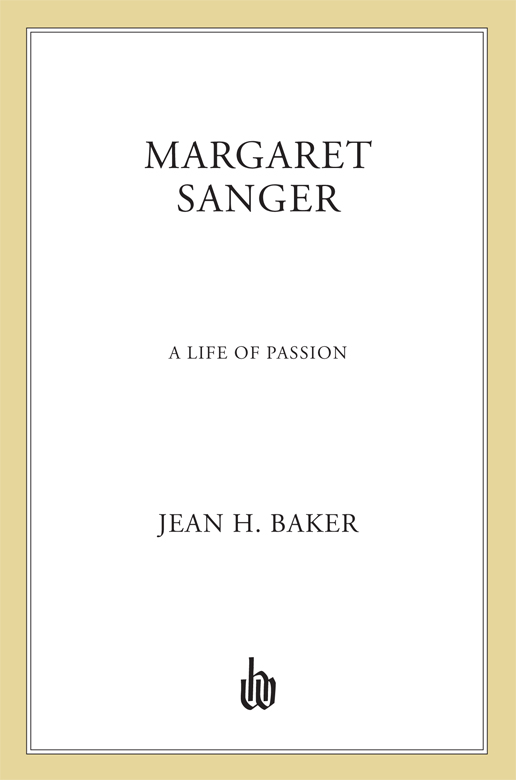
For Bricks, again
CONTENTS
INTRODUCTION
Passion: the suffering of pain as in the passion of Christ; a painful disorder or affliction of the body; a strong barely controllable emotion; a sexual urge; a strong enthusiasm for a specified thing.
Oxford English Dictionary , 5th edition
Margaret Sanger died in 1966, one of those rare, signal reformers who live long enough to celebrate the acceptance of their cause. Yet, in an ironic demonstration of her primacy in the movement she named in 1915, went to jail for in 1917, organized in 1921, and led in the United States for a half century and internationally for fifteen years, her name currently serves as a target for opponents of womens reproductive rights. Today the antichoice pickets carry their angry homemade signs as they parade in front of the Margaret Sanger Center on lower Manhattans Bleecker Street. Dont Kill Babies, Down with Abortion, they protest, as they try to engage the women hurrying inside for abortions, but more often for contraceptive advice and education about sexually transmitted diseases. Nearby, in one of the Expectant Mother Care Centers where antichoice advice is deceptively rendered, Margaret Sanger, who focused on contraception, not abortion, is described as a supporter of the Nazis.
This is purposeful propaganda: it employs a caricature of Margaret Sanger in order to discredit Planned Parenthood of America, the most important private provider of reproductive health care for women in the United States. It is an effort as well to prevent the liberalization of restrictive federal legislation that hinders funding of both national and international family planning programs. By distorting Sangers views, by attaching the label racist to her name, and by, in the most ridiculous, hateful version of her demonization picturing her as the woman who inspired Adolf Hitler, critics of reproductive rights seek to challenge not just legal abortion but access to contraception.
They also seek to drive a wedge between black and white women. To intimidate African American women from seeking legal abortions, Georgia Right to Life and the so-called Radiance Foundation recently advertised on roadside billboards outside of Atlanta that black babies are an endangered species. The billboards were eventually taken down, but references to Margaret Sanger remained on the Georgia Right to Life website. There, condemned by inaccurate misrepresentations about her life and work, she is labeled a eugenicist who worked to eliminate the black race. So intense and pervasive is this campaign to repudiate Sanger that even a staff member at Planned Parenthood of New York admitted that he did not talk much about Sangerthough a clinic named in her honor was on the floor belowbecause, after all, she was a racist and eugenicist, those lazy ist labels that obscure and, in this case, defile.
In 2009 such was Sangers reputation that when Secretary of State Hillary Clinton received Planned Parenthood of Americas annual Margaret Sanger Award, there was intense criticism. Few remembered that Martin Luther King Jr. had accepted the same award in 1966. On that occasion his wife, Coretta King, acknowledged striking similarities between the civil rights movement and Margaret Sangers efforts to obtain contraception for all Americans.
Doubtless, Margaret Sanger would not be surprised at her enduringly controversial reputation among detractors who would limit womens freedom. She lived an acknowledged tumultuous existence amid her critics, though she would certainly protest the inaccuracies, misrepresentations, and sound-bite misquotations that now encrust her historical reputation. Nor would she, a woman who spent most of her life trying to liberate women, be shocked by the continuing controversy over womens reproductive rights that makes her memory a contested one in which her name is employed as a despised symbol. What might astound her is the way that, unlike heroes of other reform movements, she has been written out of history, thereby easily caricatured and denied the context required for any fair appraisal of her life and work.
Other women reformers, especially those associated with voting and temperance, have emerged as women worthies of unassailable virtue, their good works respectfully chronicled in the context of their times, their faces memorialized on coins and in history books. Sanger is different. Until recently, with the publication of Ellen Cheslers Woman of Valor: Margaret Sanger and the Birth Control Movement in America and Esther Katzs edited volumes of The Selected Papers of Margaret Sanger , she has attracted not only critics who find her useful for their antichoice endeavors, but also, from a different, more nuanced perspective, progressive detractors.
Held to a paradoxical double standard by the latter, Sanger is accused of deserting her early feminist principles, at the same time that some historians have discovered in her persisting radicalism and confrontational tactics, especially against the Catholic Church, an obstacle to the progress of the birth control movement. She deserted her working-class friends in the 1920s, goes this indictment, for the rich society women of New York who contributed the financial support for her fledgling American Birth Control League (ABCL). She is accused of being antiblack, though she spent time and money establishing birth control clinics for African Americans both in Harlem and in the South. But these very clinics are considered examples of her desire to eradicate the African American population.
An entire book published in 2005 focused on her supposedly rabid eugenicism without considering the context of a now heretical, but earlier popular, progressive effort to limit the number of dysgenic Americans. During Sangers time, eugenicismthe belief that it was possible to improve the qualities of the human race through scienceenrolled American presidents, from Theodore Roosevelt and Woodrow Wilson to Herbert Hoover; Supreme Court justices, including Oliver Wendell Holmes and Louis Brandeis; along with scientists from the most prestigious institutions in the United States. It promoted enlightened parenthood and raising healthy children, and also, in its darker side, supported involuntary sterilizationall in the name of improving heredity. It is no defense of Sanger to place her within the conventional wisdom of her times on this matter, though it is important to have a more nuanced view of her perspectives and the reasons she accepted aspects of a mainstream movement dedicated to improving human beings.
Sangers reputation suffered in several biographies and studies of the history of birth control written shortly after her death. Her sins were manifold. Ardent feminists of the 1970s complained that she medicalized birth control, delivering the authority over contraception to physicians when it should have stayed under the authority of women. If it had not been for Margaret Sanger, according to recent critics, the pill would not require a doctors prescription and health plans could not deny coverage, as some do now, without violating the due-process rights of women to health care. Moreover, in her one-dimensional approach promoting birth control, she failed to create a broad-based, sustainable feminist organization. Nor, goes another complaint, did she comprehend that separating sex from reproduction, one of her enduring contributions to womens (and mens) lives, did not spell liberation for all women.
And as for Sangers character, some earlier historians portray her as a selfish woman, pathologically interested in power, who promoted her uniqueness but who in fact had a minimal effect on sexual behaviors and fertility rates, which were changing during the first decades of the twentieth century because of material forces, not because of Margaret Sanger. In this criticism, Sanger was a difficult woman who enjoyed her later role as a prima donna, and was responsible for the factions within a marginalized movement at a time when unity was essential. She should have positioned birth control as a free speech issue, as did her rival Mary Ware Dennett. Even her tactics failed: a string of patchwork clinics could never bring birth control to the poor, and in another of the contradictions surrounding Sangers reputation, if establishing clinics was her intention, such tactics revealed eugenic designs. Moreover, before the pill, she supported her favorite contraceptive device, the pessary, far too long, though contradictorily, she also promoted ineffective spermicides. As a sex educator, she considered only traditional heterosexuality and publicly supported one of the pillars of womens oppressiontraditional marriage.







